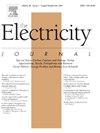未来无二氧化碳可调度发电的最终灵活性:荷兰的转型之路
IF 2.2
Q1 Social Sciences
引用次数: 0
摘要
随着可再生能源间歇性供电的增加,电力系统的整合面临挑战,需要新的供需匹配方法。可调度容量预计仍将是最终灵活性的重要来源,尽管每年只有几个小时处于活跃状态。我们通过文献综述和专家访谈,评估了荷兰不同的无二氧化碳可调度电力方案的(不)优势。随后,我们利用这些发现和不同的政策目标来预测可能的过渡途径。对于荷兰而言,这些途径主要在短期内存在差异,但在长期内则与基于氢的解决方案保持一致。本文章由计算机程序翻译,如有差异,请以英文原文为准。
Ultimate flexibility in future CO2-free dispatchable power generation: Transition pathways for the Netherlands
With the increase in intermittent power supply by renewables, there is an integration challenge in the power system and a need for new approaches to supply-demand matching. Dispatchable capacity is expected to remain an essential source of ultimate flexibility, although active for only a few hours per year. We assess the (dis)advantages of different CO2-free dispatchable power options for the Netherlands through a literature review and expert interviews. Subsequently, we use these findings and different policy goals to project possible transition pathways. For the Netherlands, these pathways differ mainly in the short-term, but align on a hydrogen-based solution in the long-term.
求助全文
通过发布文献求助,成功后即可免费获取论文全文。
去求助
来源期刊

Electricity Journal
Business, Management and Accounting-Business and International Management
CiteScore
5.80
自引率
0.00%
发文量
95
审稿时长
31 days
期刊介绍:
The Electricity Journal is the leading journal in electric power policy. The journal deals primarily with fuel diversity and the energy mix needed for optimal energy market performance, and therefore covers the full spectrum of energy, from coal, nuclear, natural gas and oil, to renewable energy sources including hydro, solar, geothermal and wind power. Recently, the journal has been publishing in emerging areas including energy storage, microgrid strategies, dynamic pricing, cyber security, climate change, cap and trade, distributed generation, net metering, transmission and generation market dynamics. The Electricity Journal aims to bring together the most thoughtful and influential thinkers globally from across industry, practitioners, government, policymakers and academia. The Editorial Advisory Board is comprised of electric industry thought leaders who have served as regulators, consultants, litigators, and market advocates. Their collective experience helps ensure that the most relevant and thought-provoking issues are presented to our readers, and helps navigate the emerging shape and design of the electricity/energy industry.
 求助内容:
求助内容: 应助结果提醒方式:
应助结果提醒方式:


